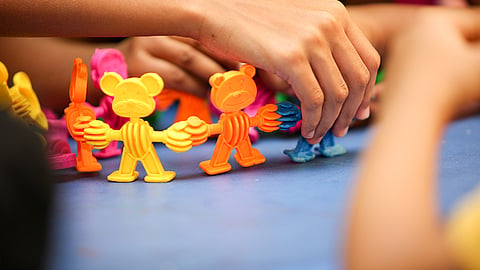
- Mental health mattersMental health matters
- Mental IllnessMental Illness
- Life stagesLife stages
- Caregiving
- Workplace Mental Health
- Legal Matters
- Subscribe

Children who have a sibling with a mental illness, a disability or special needs are likely to be aware, even from a young age, of the difference between them and their sibling. They may grow up to be more sensitive and emotionally mature than their peers, or be resentful of the situation because their sibling gets ‘all the care and attention'.
How the parents manage the situation may, in part, determine what kind of attitude the sibling grows up with, say experts. As a parent, here are some things you can do to help the sibling cope:
Talk about the illness: Talk to your child (in an age-appropriate manner) about the illness the sibling has and that the sibling may require assistance with certain tasks. Instead of presenting it as the parents’ responsibility to care for the unwell child, make it the entire family’s role to support the child who is unwell. You can have open conversations about the illness, and discuss or plan what the family as a unit can do; and how each person can contribute individually as well.
It’s us against the illness: Often, the dynamics of a family with one child who is well and one who isn’t becomes that of parents-versus children; and the child who is well may see himself or herself ‘competing’ with the sibling for parents’ attention. As a parent, you can tell the child what the sibling is going through and what the impact of the illness is, and that you will fight it together.
Involve the child in the sibling’s care: As a parent, you can help your child understand what the sibling is going through and ask him or her to be sensitive to it. For example, children with certain developmental disorders may get aggressive if they hear loud noises or music. So instead of asking your child to keep the noise down, you can suggest another option and say clearly why: “Could you use earphones because the sound of loud music can be stressful to your brother/sister?” This would help the child understand that you’re asking him or her to change something because of the sibling’s illness.
Involve them in the sibling's care: You could ask your child to remind the sibling to take medication, eat with them, or play with them. You could check with your child at regular intervals, if the help they are offering to the sibling is causing stress.
Acknowledge both children's needs: Make it a point to talk to your child, even (or especially) when the sibling needs your time and attention. If the unwell child has an emergency and needs to be taken to the hospital, and the sibling has a broken toy, the unwell child’s situation is more critical. But take a moment to acknowledge what the sibling is going through and share your intention to come back to it when the crisis has passed.
Keep communication channels open, spend quality time together: It may not be possible for parents to spend equal amounts of time with both children, if one of them has special needs. What you could do instead is to spend quality time with the child who is well. Make sure you check in with the child regularly. You could initiate certain rituals where you or your spouse can spend uninterrupted time with the child (combing hair, getting ready for school, or storytime before bed) while the other cares for the child with special needs. You could also connect with the child through board games or other activities they enjoy; this could help break the ice and get the child talking to you.
Help them deal with stigma: Children who have a sibling with special needs are indirectly affected by the stigma - more so when they interact with other children their age. When their friends or classmates tease or speak lightly about their sibling, they are torn between wanting to join them (so they are accepted in their peer group), and wanting to protect their sibling. The situation becomes more stressful when parents insist that they include the siblings in their games.
What can you do instead? Tell your child to be sensitive to the sibling and anyone else who may have a similar condition, by telling them - “We don’t call them names or make fun of them".
Seek support if you need it: Parenting is not easy, and it’s harder when you have a child who isn’t in the best of health. Identify your own ways of caring for yourself, and seek sources of support. This will ensure that you don’t pass on your own stress to your children, and help you care for them better.
Stay alert to red flags: If one of your children has a mental illness, the sibling may be genetically at a greater risk of being diagnosed with the illness than the rest of the population. If you notice any of the signs of the sibling's mental illness in the child, seek help immediately. Other red flags could include: sudden change in behavior, prolonged anger or sadness, withdrawal from family and friends, refusal to go to school, and substance abuse. If you notice any of these signs in your child, reach out to an expert as soon as possible.
We are a not-for-profit organization that relies on donations to deliver knowledge solutions in mental health. We urge you to donate to White Swan Foundation. Your donation, however small, will enable us to further enhance the richness of our portal and serve many more people. Please click here to support us.
